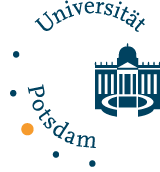Diana Michl
PhD candidate
supported by the Friedrich-Naumann-Stiftung für die Freiheit
Dissertation Project:
Semantic Processing of Idioms in Healthy and Language-Impaired Adults:
Effects of metonymy, metaphor, and (non)literalness
Nonliteral language is literally everywhere - whether we hear or read it or use it ourselves. Typical examples are idioms, fixed expressions that often convey a nonliteral meaning. Think of metaphorical ones such as "Wir sitzen in der Tinte/We're in the soup", "die Wahrheit kommt ans Licht/The truth comes to light" and metonymic ones "Sie hat eine böse Zunge/She has an evil tongue" or "Du musst immer das letzte Wort haben/You always need to have the last word".
Both kinds are easily understood, but the cognitive and semantic relationships between what is said and what it meant differs. If their cognitive structure differs in our minds, semantic processing difficulty in the brain might also differ.
The Research Questions
- Do kind and degree of nonliteralness influence how we process idioms? Is metonymy easier than metaphor, are literal idioms easier than both?
- If these different cognitive structures underlie comprehension, are they reflected in reading time, lexical decision and priming effects?
- Finally, what can we conclude for how idioms are stored in the mental lexicon?
I examine these issues in German native speakers, in both healthy and impaired speakers.
Publications
- Michl, D. (2019). Metonymies are more literal than metaphors: Evidence from ratings of German idioms. Language and Cognition,11(1), 98-124. doi:10.1017/langcog.2019.7
- Michl, D. (2019). Speedy Metonymy, tricky Metaphor, irrelevant Compositionality: The Power of Literalness in Idioms in Reading and Rating. Journal of Psycholinguistic Ressearch, 2(1), 56-82. doi:10.1007/s10936-019-09658-7
Presentations
- "Straightforward metonym, versatile metaphor: The power of non-literalness in how adults perceive idioms" - New empirical and theoretical perspectives on the literal/non-literal meaning divide (2016/10), Stuttgart
- "Designing a self-paced reading study on literal and non-literal idioms" - Participant at the DGfS Summer School "Mapping Meaning" (2016/8), Tübingen
- "Do a thousand words paint a picture? - How adults perceive metonymic and metaphorical idioms" - 6th UK Cognitive Linguistics Conference (2016/7), Bangor
- "How adults perceive nonliteral idioms - An empirical corpus for semantic processing", Poster - 2nd Usage-Based Linguistics Conference (2016/6), Tel Aviv
- "Why are metonyms more transparent than metaphors?" - E-conference: Cognitive Linguistics (2015/12), Wroclaw
- "Cognitive processing of metaphorical and metonymic idioms - pilot studies" - Idiom Workshop (2015/11), Potsdam
- "Non-literal language - semantic and cognitive processing of metaphor, metonymy, and phraseologisms" - EMCL Seminar (2015/7), Potsdam
Research Interests and Other Interests in Linguistics
- cognitive linguistics and semantic processing, in healthy and (psychiatrically) impaired speakers
- idiomatic language and CxG
- nonliteral language, especially figurativeness and its various kinds, figures of speech and stylistic devices
- sociolinguistic phenomena such as dialect, sociolect, jargon, and accent
About me
I started my project in November 2014 in Potsdam. Before, I studied English Linguistics, Rhetoric, and Philosophy in Tübingen and Leeds. I have always been fascinated with all aspects of language, what it is, what it can do and how it can be used - especially in the manifold nonliteral ways.

